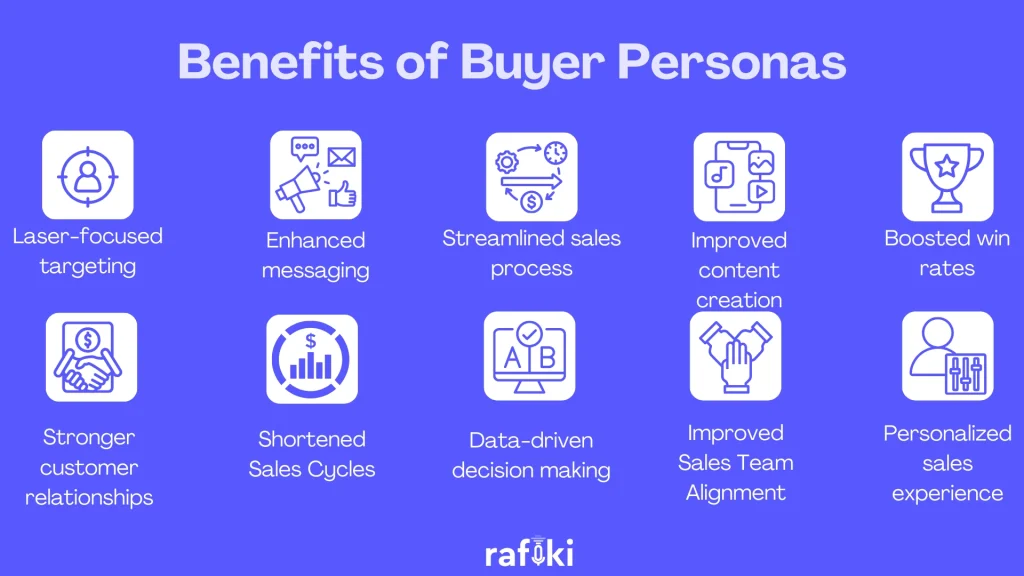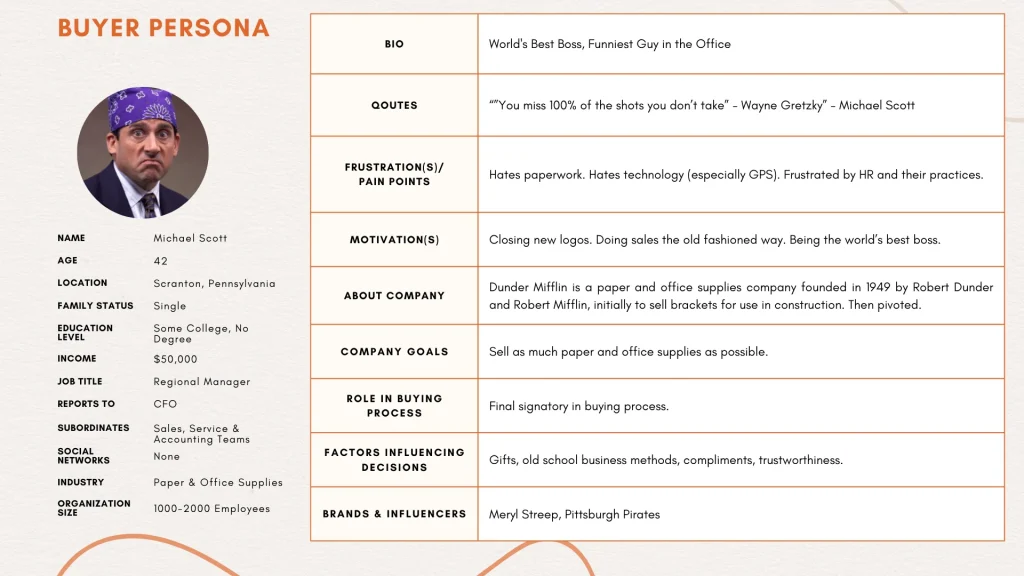Why Rafiki
Pricing


Pricing
Solutions

RevOps Leaders
Synchronize revenue generating functions

SDR Leaders
Get your team aligned and Coach your Reps 3x faster at scale

Sales Leaders
Unlock pipeline truth, drive confident forecasts

Ever feel like you're firing sales pitches into the void, hoping something sticks? Every business school, sales experience and mentor would teach you early on that you need to understand whom you’re targeting. This means that targeting the right customers is crucial for sales success. That's where buyer personas come in.
A buyer persona is a detailed profile of your ideal customer, packed with insights into their goals, challenges, and buying behaviors. The main objective of crafting a buyer persona is to gain clarity on the customer. This not only helps you in the effectiveness of your targeting itself, but you will also know for sure whether you’ve set the right targets in crosshairs. By understanding your buyer persona, you can tailor your sales approach to resonate with their specific needs, leading to more qualified leads, higher conversion rates, and ultimately, a boost to your bottom line.
Let's dive deeper into what buyer personas are and how you can leverage them to transform your sales game.
Imagine a superhero with a superpower to see right into the minds of your ideal customers. That's essentially what a buyer persona does for your sales team. It's a semi-fictional character sketch based on market research and real customer data. This persona captures your ideal customer's demographics, like age, job title, and industry, but it goes way beyond that. It dives into their deepest desires and frustrations. What are their professional goals? What keeps them up at night? Why? What buying process do they follow?
By understanding these aspects of your ideal buyer, you can craft targeted messaging that speaks directly to their needs and concerns. Here are all the benefits of crafting buyer personas:

There can be multiple buyer personas for your business, depending on the products or services you offer. For instance, a software company might create separate personas for marketing managers (interested in brand awareness tools) and sales directors (focusing on lead generation features). In the B2C space, an athletic apparel brand might have a buyer persona for a fitness enthusiast seeking high-performance workout gear and another for a casual jogger prioritizing comfort and style.
It's important to note that B2B and B2C buyer personas differ significantly. B2B buyer personas typically represent entire departments or committees within a company who influence the purchase decision. Think about a marketing automation platform. The buyer persona could encompass the marketing manager who champions the need for the tool, the CFO who analyzes the budget, and the IT team that ensures integration with existing systems. Conversely, B2C buyer personas usually represent individual consumers making independent purchasing decisions.
So, you're convinced that buyer personas are what your sales team needs. Now, let's get down to business and unpack how to create them. Here's a step-by-step approach:
The first step is to gather customer data. Look at your existing customer relationship management (CRM) system for goldmines of information on demographics, purchase history, and past interactions. Salesforce, HubSpot CRM, and Zoho CRM are some popular CRM tools with robust reporting features. Don't forget to tap into your sales reps' knowledge too. Conduct brainstorming sessions to discuss their ideal customers and common sales objections they encounter.
Segment your existing customers into groups based on shared characteristics. This could be industry, company size, or job title. Surveys sent through email marketing platforms like Mailchimp or Constant Contact can help gather additional customer data to refine your segmentation.
Here's where the rubber meets the road. Schedule in-depth interviews with ideal customers or prospects who fit your target segments. You can find interviewees through your existing customer base or through professional networking platforms like LinkedIn. Ask open-ended questions to understand their goals, challenges, and buying process. Consider using Rafiki to capture these interviews flawlessly and automatically transcribe them with superior accuracy. This frees you up to focus on actively listening and probing deeper during the interview.
Compile all your research findings into a buyer persona profile document. Include sections for demographics, motivations, goals, challenges, preferred communication channels, and buying behaviors. Flesh out your persona with a name, backstory, and even a quote to make it come to life.
Don't just create and forget! Regularly revisit your buyer personas and update them based on new customer interactions and market trends.
While buyer personas are foundational sales tools, updating them is crucial to maintain their effectiveness. Here are some key times to revisit and potentially conduct new interviews for your buyer personas:
Ready to craft your buyer personas? Download our free buyer persona template to guide you through the process step-by-step. This downloadable template includes sections for all the key elements of a buyer persona, making it easy to build out detailed profiles of your ideal customers.

Buyer Persona Template Example
Understanding your ideal customer is the key to unlocking sales success. Buyer personas provide a roadmap to achieving that understanding. By incorporating buyer personas into your sales strategy, you can target the right prospects, craft compelling messaging, and ultimately close more deals.
Don't underestimate the power of research in crafting effective buyer personas. Rafiki's conversation intelligence features like Smart Call Summary can streamline your interview process and ensure you capture every valuable customer insight. Explore how Rafiki can help you build and refine your buyer personas with a free 14-day trial!
Optimize your Buyer Personas with Insights